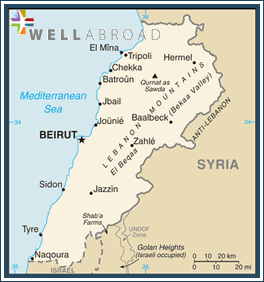|
MOST RECENT ALERTS
There's no recent alert.
|

|
|||||||||||||||
| COUNTRY OVERVIEW | ||||||||||||||||
|---|---|---|---|---|---|---|---|---|---|---|---|---|---|---|---|---|
|
| COUNTRY GENERAL INFORMATION | |||||||
|---|---|---|---|---|---|---|---|
| Language: |
Arabic (official), French, English, Armenian |
||||||
| Currency: | Lebanese Pound (LBP) | ||||||
| Predominant Religions: |
Muslim 59.7% (Shi'a, Sunni, Druze, Isma'ilite, Alawite or Nusayri), Christian 39% (Maronite Catholic, Greek Orthodox, Melkite Catholic, Armenian Orthodox, Syrian Catholic, Armenian Catholic, Syrian Orthodox, Roman Catholic, Chaldean, Assyrian, Copt, Protestant), other 1.3% |
||||||
| National Holidays: | Independence Day, 22 November (1943) | ||||||
| Economic Status: |
The Israeli-Hizballah conflict caused an estimated $3.6 billion in infrastructure damage in July and August of 2006, and internal Lebanese political tension continues to hamper economic activity. |
||||||
| Security: |
Lebanese Armed Forcees (LAF): Army, Navy, and Air Force |
||||||
| US Presence: |
U.S. Embassy in Beirut
Awkar-Facing the Municipality, Main Street Beirut, Lebanon Tel: 04 – 543 600 Fax: 04 – 542 600 |
||||||
| Document Requirements: |
Passports and visas are required. American citizens coming to Lebanon for tourism can purchase a short-term visa at the border. Travelers holding passports that contain visas or entry/exit stamps for Israel will likely be refused entry into Lebanon. Travelers whose passports contain Israeli stamps or visas and who also hold an "Arab nationality" may be subject to arrest and imprisonment. Travelers who have overstayed their entry visa validity in Lebanon have to adjust their status with the Central Department of Surete General (Department of Passport and Immigration) prior to their departure. Further information on entry/exit requirements can be obtained from the Embassy of Lebanon, 2560 28th Street NW, Washington, DC, 20008, tel (202) 939-6300. Travelers may also contact one of the Consulates General. |
||||||
| Major Airports: |
Airports: 7, Airports w/paved runways: 5 |
||||||
| Servicing Airlines: |
|
||||||
| Risks and Precautions: |
US Dept. of State TRAVEL WARNING for LEBANON Updated 13 May 2009 The Department of State continues to urge US citizens to avoid all travel to Lebanon due to current safety and security concerns. Americans presently living and working in Lebanon should understand that they accept risks in remaining and should carefully consider those risks. This supersedes the Travel Warning issued on September 10, 2008 and updates information on security threats and ongoing political violence in Lebanon. |
||||||
| Mortality Statistics: |
Infant MR Total: 23.39 deaths/1,000 live births |
||||||
| Immunization Indicators: |
Required: None |
||||||
| Infectious Disease Concerns: |
Cutaneous leishmaniasis is reported throughout the Middle Eastern area, especially in countries bordering the Mediterranean; visceral leishmaniasis, although rare throughout most of the area, occurs focally in Iraq, Saudi Arabia, Syria, and Turkey. West Nile Virus is another vector-borne infection found in the region. Measles continues to reported from the region. |
||||||
| Overall Quality of Medical Services: |
In Beirut and the surrounding areas, modern medical care and medicines are widely available. Such facilities are not always available in outlying areas, although no location in the country is more than three hours from the capital. Doctors and hospitals often expect immediate cash payment for services, and without such payment may deny service even in emergency cases. |
||||||
| Providers in Network: |
|
||||||
| Recent Medical Threats/ Concerns/Warnings: |
Highly pathogenic avian influenza (H5N1) has been found in poultry populations in the Middle Eastern region. Avoid all direct contact with birds, including domestic poultry (such as chickens and ducks) and wild birds, and avoid places such as poultry farms and bird markets where live birds are raised or kept. |
||||||
| Communications Info: |
Country Calling Code: +961 |
||||||






